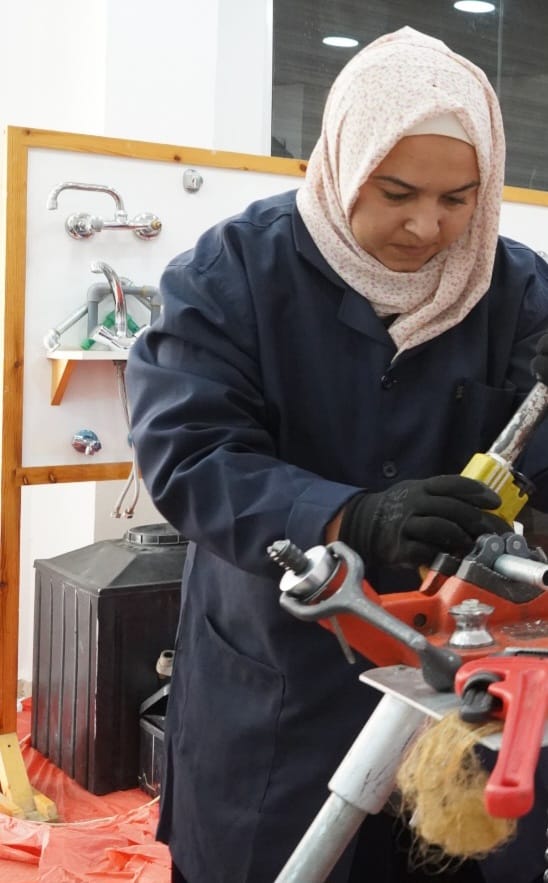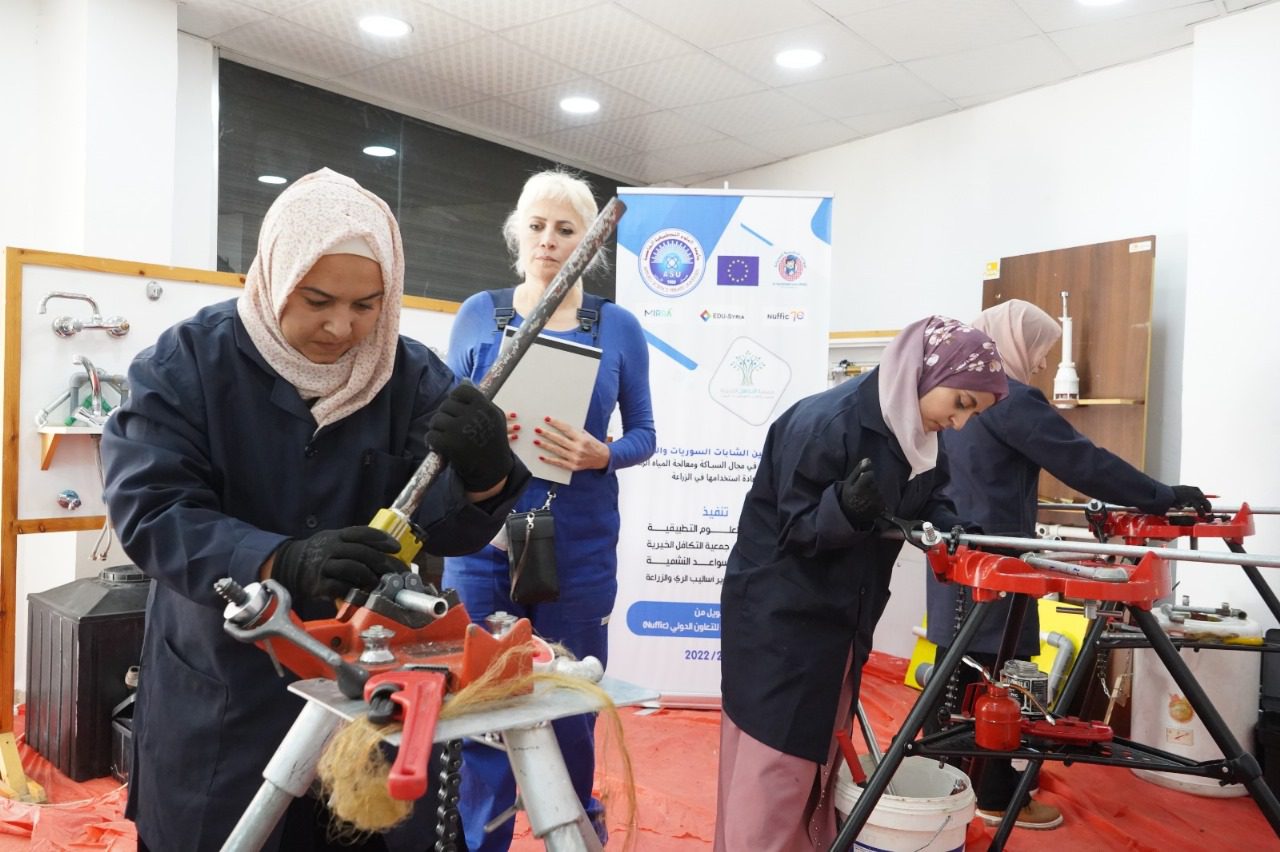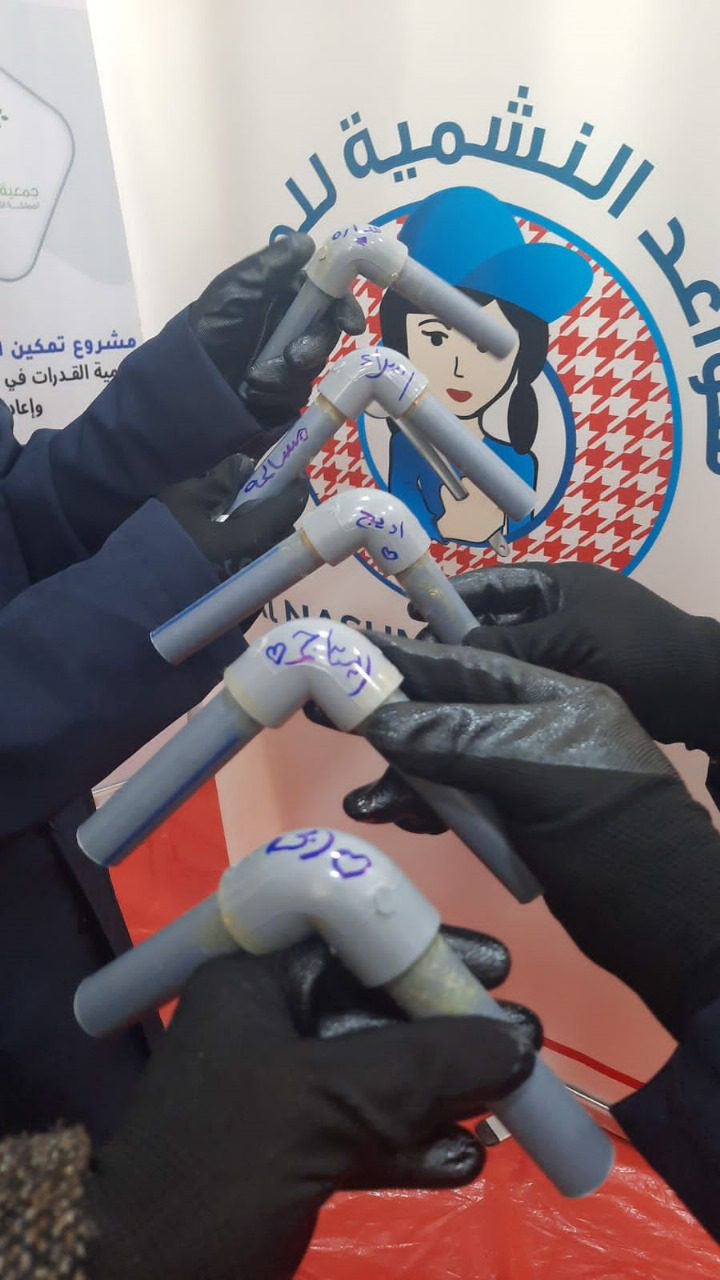A Tale of Empowerment: Jordanian Plumber Sana’s Triumph thanks to EDU-Syria
In the heart of Ramtha district, within the governorate of Irbid (Jordan), Sana Wardate is rewriting the narrative for women. With raven-black hair and a spirit as resilient as the ancient stones of her homeland, Sana stands out not merely because she’s the sole female plumber in the region, but because of the journey that led her there. At thirty, she is the main breadwinner of the household, with the weight of a family’s hopes on her shoulders.

Traditionally, the rhythmic clang of pipes and the art of plumbing were echoes dominated by men. Yet, for Sana, these sounds became her anthem of change. A few months ago, she started a new career as a plumber, thanks to the European Union’s initiative, EDU Syria. The programme was her gateway to a Technical Vocational and Educational Training (TVET). But it wasn’t merely about learning a skill; it was about reshaping her destiny.
Through the training, Sana didn’t just learn plumbing. She also acquired skills in accounting to steer her family through financial uncertainty. “This training changed my life. My husband is a day labourer and he can go days without work. At home, sometimes we didn’t have anything to eat. Today everything has changed. I was a shy and withdrawn person, this training and the job that I am doing since gave me much self-confidence » She reflects, her voice echoing the gratitude of a transformed life.
Gone are the days when Sana’s family would sit with empty plates, waiting for destiny to change. Now, with her newfound skills, she stands tall as the provider, the pillar. “My family knows they can lean on me,” she smiles, her eyes reflecting a deep well of confidence she never knew she had.
Many women, bound by societal norms, hesitate to invite male plumbers into their homes. Recognizing this gap, Sana became their solution. She built bridges, not walls, crafting a loyal clientele of women who saw her not just as a plumber, but as a trusted ally. “I know there is an important market for female plumbers in the area”, she confides.
Her reputation? Impeccable. The wholesalers, once strangers, now greet her with respect, offering deals and prices that speak volumes of her influence. “They give me great prices now that they know me!” she chuckles.
But Sana’s dreams don’t end there. With her tools in hand and dreams in her eyes, she aspires to have her own business—a haven where women, like her, can wield the wrench of independence.

TVET for Women: A Catalyst for Inclusivity and Economic Growth
The European Union and the members of the EDU Syria consortium recognize the pivotal role of empowering women in sectors traditionally dominated by men. This emphasis on inclusivity is rooted in a broader vision of achieving gender equality and fostering women’s empowerment.
To truly champion gender equality, it’s essential to dismantle age-old stereotypes that limit women to specific roles and professions. By introducing technical and vocational education and training (TVET) tailored for women in sectors like these, we not only broaden their skill sets but also challenge societal norms. Such initiatives pave the way for a society where opportunities are not restricted by gender.
Furthermore, when women actively participate in the workforce, it acts as a catalyst for economic growth. Their increased involvement fosters financial autonomy, diminishes poverty within households, and improves the overall economic landscape.
Additionally, integrating women into sectors where they are underrepresented enriches the overall skill diversity of the workforce. This enriched talent pool, in turn, fuels innovation, productivity, and problem-solving prowess within these industries. In areas facing a scarcity of skilled professionals, equipping women with the necessary training can bridge the gap, infusing vitality into the workforce.
Bridging Communities: Jordanian Host Communities and Refugees empowered by EDU-Syria
Wieke Waterschoot, programme Manager Education – Refugee Response at the EU Delegation in Jordan highlights the importance of including host communities in programme aimed initially at refugees. “It is incredibly important for several reasons, among them are the shared knowledge and experience, the promotion of social cohesion, sustainable development and enhanced economic integration”, she says.
In fact, the host community, with their vast cultural and professional experiences, as well as their understanding of the local socioeconomic context, can greatly benefit the refugees. They can provide invaluable practical knowledge, guidance, and bridge potential cultural gaps. By including the host community, there will be a better understanding and reduced potential for friction and feelings of alienation. This can guide refugees, bridging cultural divides and fostering mutual understanding. This inclusivity diminishes potential conflicts and cultivates a sense of unity and shared resilience within the community.

“Involving the host community ensures that the initiatives are compatible with other ongoing regional development projects. This approach guarantees that efforts to support Syrian refugees will also contribute to the overall growth and development of the region, without neglecting the host community. The host community can play a crucial role in integrating refugees into the local economy. They can help establish connections to the market and promote mutual economic growth”, Wieke adds.
Under the EDU-Syria initiative, numerous TVET projects have been initiated since 2015, with several extending through 2028. Collaborating with Jordan’s Luminus Technical University College (LTUC), these programmes have empowered over a thousand individuals with new skills and income opportunities. So far more than a thousand people have benefited from these training sessions allowing them to learn new trades and generate income. The number of beneficiaries is expected to exceed expectations.



























 Syria
Syria 


